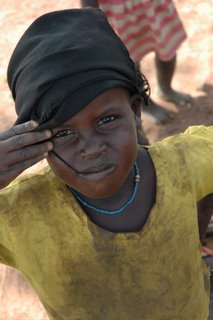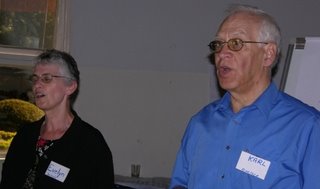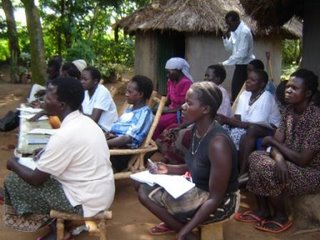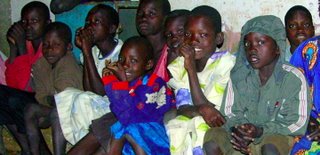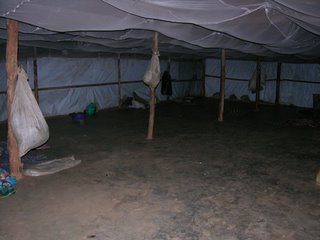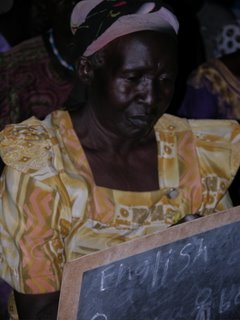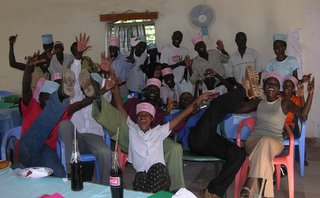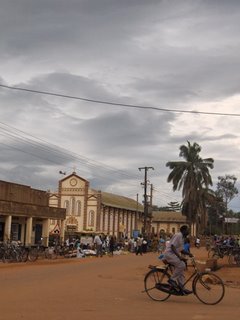
I’ve found it surprisingly challenging to reconcile hope with critical thinking about current events. I told Ben earlier in the week (on our date night, which we do every week and it’s so great!) that I was having this struggle and as we talked about the dynamic of hope the thought occurred to us that perhaps it was so hard to reconcile the desire not to blindly wait for something that was not going to happen and not giving up on it because we had a wrong view of hope. Maybe hope isn’t convincing yourself to think that something good is actually the most probable outcome, but believing that it should happen and that the good thing you hope for is closer to what God intended—closer to original design. With this little shift in my thinking it’s been easier to reconcile my mind and heart while I achingly long for peace in Uganda and reason through the complexity of the ongoing peace process. People want it so much, I want it so much. The emotional investment in this process is deep. You can see it on people’s faces. After 20 years, God, let this be the end—if not now when? When you talk to most people and ask them about what they think about the process the answers are on the tip of every tongue “I just want to go home,” or “I just want my sister to come back from the bush, that’s all I want.” I’m often humbled and baffled by the unflinching hope that many in the north express—but I do wonder, everyone has their breaking point, if this process fails will they reach it?
I spent most of this week with a delegation from MCCs advocacy offices from DC, Ottawa, and the UN office in New York as well as from the Africa and Peace departments in Akron. It was refreshing to be with them, to experience Uganda with them, and to discuss how we can better support the peace process through advocacy. We had a series of meetings with people from the groups of cultural and religious leaders who have been supporting/observing, military, NGO community, people in IDP camps, people on the monitoring team for the cessation of hostilities agreement, observers of the process from Juba, and others. The views they had, the messages they wanted to send were diverse, and rather than give my own ideas I thought I’d capture a few from what I heard: (paraphrased)
Why is the international community silent? The West is too silent, not showing oneness with Africa. If this conflict was happening somewhere else there would have been more support from the US. (Religious leader)
The incidences of violence around Juba reported in the media are not UPDF and LRA. Most incidences that have taken place have been the result of misinformation. (Monitoring team member)
I think that the government is trying to save face and that the LRA are rebuilding. There is a lack of commitment to relieve the suffering of Acholi people on both sides. They need to build confidence: don’t discuss wounds, don’t praise yourself, the negotiation should include the suffering people because they are motivated to work for peace. Maybe the negotiating teams should visit a camp so that they can get motivated (community leader)
Are you really sure that peace and justice are friends? Who is the parent in this conflict? Parents take all the costs of their children’s misbehavior. Convince the ICC to bend the rules. (Community leader)
What’s needed for peace is restorative justice. This is not a tribal war but crimes against humanity by terrorists. The military method hasn’t succeeded for 20 years. This might work. It is the most hope we’ve had. In the past the LRA wouldn’t eat food provided by the government of Uganda. But now they are accepting food, so there is some trust. (Formerly abducted person)
We want a statement from the Secretary General of the United Nations not only Jan Egeland. Now the Secretary General is leaving, I hope the next one will at least say something. (Religious leader)
Why is Kony so difficult to capture? We have a saying in Acholi, a coward lives longer. But the fighters are there in the bush, for them this is about reorganization. The LRA negotiating team are people who have a power hangover and they are not fighters. They are waiting for it to fail and getting attention and money. If you think I’m lying time will tell. (Military)
Why is Kony so difficult to capture? Because he is surrounded by children. Children are his water. (Community leader)
When I met with Kony, he had 3 messages: 1. He is for peace. 2. Watch and witness who will spoil the process. 3. The suffering should stop and the war should end. He is willing to do Mato Oput (reconciliation ceremony, that means drinking bitter herb) with the community but is not sure how it could be done with the government, since the government is not a tribe. (religious leader)
What specific confidence building measures are needed? UN supportive statements and a visit from the Secretary General to Northern Uganda. The African Union to respond to the call to be on the monitoring team. “Tell off” the government of Uganda to withdraw all troops in Sudan. Media should send positive supportive messages. It should not be a hurried process—there is no hurry in Africa—we need community views and this takes time. LRA needs to listen to the community. Focus on the victims and the costs of more war. (group of cultural and religious leaders)
These all are not exact quotes, but they are the things I remember and scribbled down in my notebook while I listened to people. Someone said, knowledge speaks, and wisdom listens. Trying to be wise, I’m listening--to those who may have accurate information or may be confused and misinformed but who all have a reason behind their words. I have many questions, but one is at the forefront of my mind. In any negotiation, a party’s position is strengthened when their alternative to a negotiated agreement is good. Unfortunately, all the parties have pretty decent alternatives, which may be why we've seen so many walk-outs. As I see it, the degree to which those alternatives are weakened motivation to settle without violence will be strengthened. How do the Juba peace talks become the most attractive option, and how can the alternatives to a negotiated agreement be minimized?
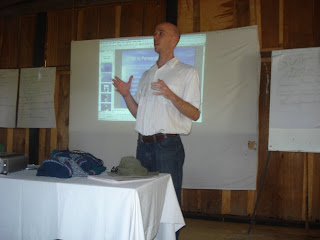




























 It broke my heart. Partly, because I miss it and partly because it seems impossible for the people of northern Uganda. And then at the same time those moments happen here too. Some are quiet and simple and others are more profound. I had a simple one yesterday when I walked home under a red sun after a meeting with the management team that was energized and full of common purpose. And then Ben and I sat on the front porch and watched the sun sink and talked about the day. I had a moment like that last year when I first saw Acholis dance. While they sweat and kicked up the red dust to the drums I thought, “this is what they were meant to do, this is how it’s supposed to be with the young people dancing and the children trying from the sides and the old people nodding and watching—they weren’t meant for this war, destruction, displacement and poverty.” But that moment happened right in the middle of it. In a way that’s comforting, because it means that whatever those moments are or whatever they reflect—the longing for home—the restoration of things to the way they should be—life at its fullest—they are more powerful and can’t be overcome by the most gruesome war, or by massive displacement or abject poverty. Human beings will still dance.
It broke my heart. Partly, because I miss it and partly because it seems impossible for the people of northern Uganda. And then at the same time those moments happen here too. Some are quiet and simple and others are more profound. I had a simple one yesterday when I walked home under a red sun after a meeting with the management team that was energized and full of common purpose. And then Ben and I sat on the front porch and watched the sun sink and talked about the day. I had a moment like that last year when I first saw Acholis dance. While they sweat and kicked up the red dust to the drums I thought, “this is what they were meant to do, this is how it’s supposed to be with the young people dancing and the children trying from the sides and the old people nodding and watching—they weren’t meant for this war, destruction, displacement and poverty.” But that moment happened right in the middle of it. In a way that’s comforting, because it means that whatever those moments are or whatever they reflect—the longing for home—the restoration of things to the way they should be—life at its fullest—they are more powerful and can’t be overcome by the most gruesome war, or by massive displacement or abject poverty. Human beings will still dance.

